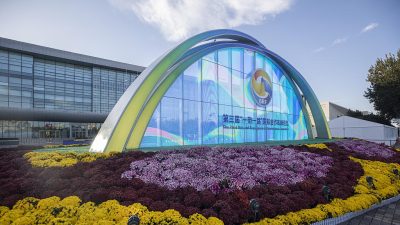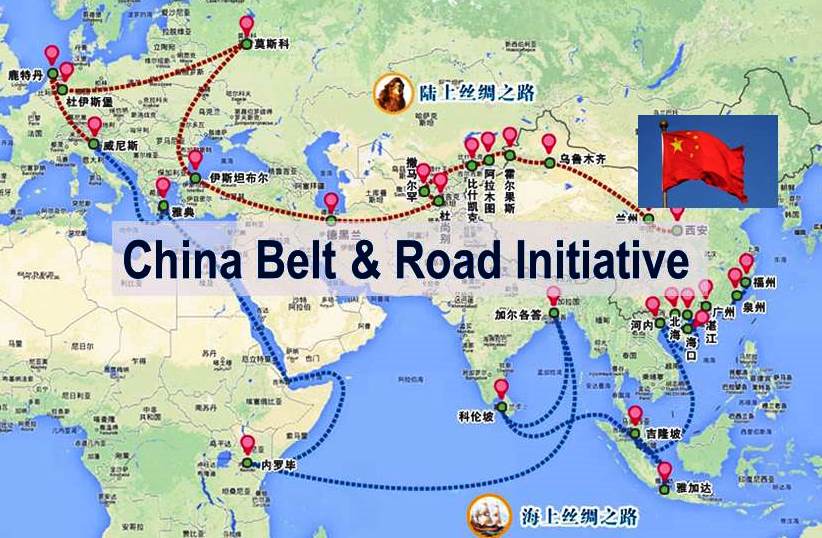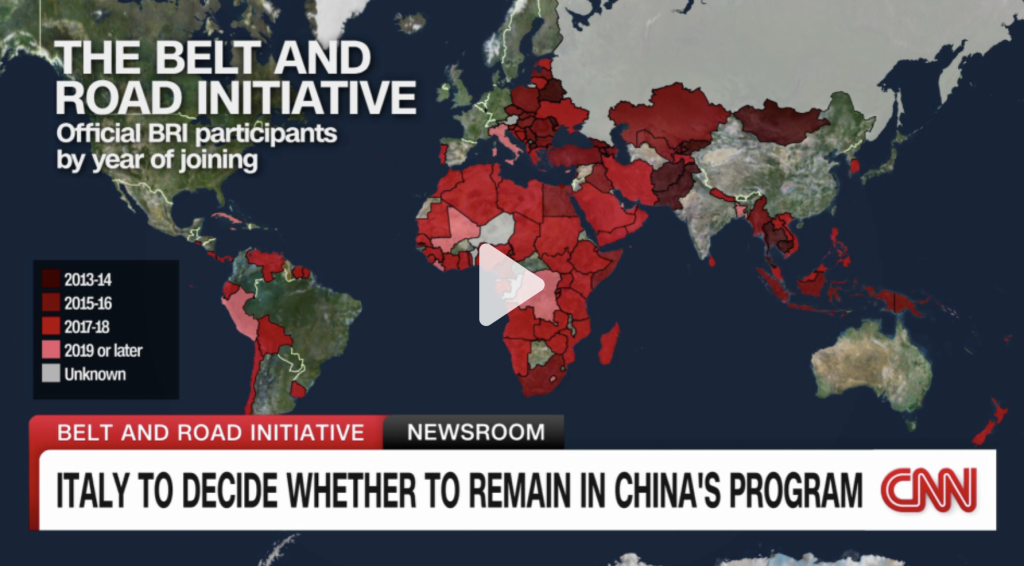Beijing’s Third Belt and Road Forum: Projecting a “Human Kind of Community with a Shared Future”

All Global Research articles can be read in 51 languages by activating the Translate Website button below the author’s name.
To receive Global Research’s Daily Newsletter (selected articles), click here.
Click the share button above to email/forward this article to your friends and colleagues. Follow us on Instagram and Twitter and subscribe to our Telegram Channel. Feel free to repost and share widely Global Research articles.
***
 China’s President Xi Jinping, in his Opening Statement to the 3rd Belt and Road Forum in Beijing, said that “China is doing well only when the world is doing well, and if China is doing well, the world is doing even better.”
China’s President Xi Jinping, in his Opening Statement to the 3rd Belt and Road Forum in Beijing, said that “China is doing well only when the world is doing well, and if China is doing well, the world is doing even better.”
He projected a humankind of community with a shared future.
Continuing with his opening remarks, Xi said,
“One of its [BRI’s] most significant facets, is its emphasis on green infrastructure projects, and renewable energy development. Promoting the ancient Silk Road’s spirit of peace and cooperation, mutual learning and mutual benefits, openness, and win-win, is the most important source of strength for the Belt and Road cooperation.”
The Forum took place from 17-18 October 2023 in Beijing, marking the 10th Anniversary of the Belt and Road Initiative (BRI), which President Xi launched in September 2013 during a state visit to Kazakhstan.
As a preamble to describing the 3rd Forum’s forward-looking perspective on the world, The China Daily (19 October 2023) introduced the BRI Forum with its historic past:
“Over two millennia ago, inspired by a sincere wish for friendship, our ancestors travelled across grasslands and deserts to create a land Silk Road connecting Asia, Europe and Africa, leading the world into an era of extensive cultural exchanges. More than 1,000 years ago, our ancestors set sail and braved the waves to open a maritime Silk Road linking the East and the West, beginning a new phase of closer communication among peoples.”
“Spanning thousands of miles and years, the ancient silk routes were not only routes for trade but also roads for cultural exchanges. They made a great contribution to human progress. In the 1980s, the United Nations and some countries began to envisage the Eurasian Land Bridge, the Silk Road Initiative, and other plans, reflecting a common wish to engage in communication and cooperation.”
“In March 2013, President Xi Jinping proposed the vision of a global community of shared future. In September and October that year, he raised the initiatives of joining with others to build a Silk Road Economic Belt and a 21st Century Maritime Silk Road (Belt and Road Initiative, or BRI).”
The forum was attended by 130 countries, of which 24 were represented by their leaders. In glaring absence were dignitaries from the US and Europe, except for Hungary’s Viktor Orban. Other heads of state present were Kazakh President Kassym-Jomart Tokayev, Indonesia’s Joko Widodo, as well as many from Africa, Asia, and Latin America. Even the Taliban, the quasi-representatives of Afghanistan’s government, sent a delegation.
Significantly, among the attendees of the 3rd Belt and Road Forum was UN Secretary General Antonio Guterres.
By contrast, the 2019 forum was attended by 37 world leaders including 5 from Europe, Italy, Greece, Austria, Portugal, and the Czech Republic.
Italy, an important EU member and the only G7 member, is currently part of the Belt and Road. However, Italy did not attend the forum.
Only a year ago, Italy’s PM Giorgia Meloni praised the BRI cooperation between her country and China. In the meantime, under strong pressure from Washington and the EU, she is considering exiting the Belt and Road when the current pact expires in March 2024. It is not done yet as Ms. Meloni is most likely asking for a parliamentary vote on the BRI membership.
See this, Italy: US Pressure to Exit the Chinese “Belt and Road”. To Stay or Not to Stay in the BRI? (25 July 2023).
The following video clip of a CNN interview with PM Meloni and with Ms. Zoe Liu, a Chinese Studies Fellow, Council on Foreign Relations, is quite revealing about the slanted interview style and opinion-making – of western media.
The absence of European and other world leaders, plus the strongly pronounced alliance between Presidents Xi and Putin, demonstrating throughout close solidarity, underscored the growing division between East and West, or between the Global South and the Global North.
In other words, a deepening chasm between the world’s two power poles, East and West, is visible at any major world event, when issues of global significance are discussed.
For example, Xi and Putin were leading a small group of country delegations which did not condemn Hamas for attacking Israel, knowing well that for the last seven-plus decades, Israel has increasingly and randomly murdered Palestinians, evermore oppressed Palestine, and in 2007 made Gaza into the world’s largest open-air prison of 2.3 million people.
China has been for many years a strong supporter for Palestine freedom, for a two-state solution. But Israel, with the support of Washington, has no interest in what looks like the only way out, into peace and hopefully over time a harmonious cohabitation of two neighboring sovereign countries.
Most likely, China and Russia know that Israel herself was behind the attack by Hamas. Israel is the presumed creator and funder of Hamas. Making the Hamas October 7 assault a “false flag” – leading to thousands of deaths on both sides, but mostly Palestinians. And the conflict is far from over.
Instead of launching accusations, Russia and China called for a cease-fire and peace negotiations.
It is not to be excluded that as part of a peace proposal, China and Russia may advance the idea of rebuilding Gaza and the West Bank under the Belt and Road Initiative. This might be a plan finding the Global South’s approval.
Just in case, it would be interesting to see the West’s reaction to such a positive and constructive suggestion – much more than has come forward from the west in the last 75 years during which Israel has systematically attempted to annihilate Palestine.
Xi’s show of solidarity with Putin at the Belt and Road Forum also underscored the deepening division between the world’s major powers. It shows the world that cooperation with the West – a world in harmony — is not part of the Globalists’ agenda.
*
Just as a reflection – does anybody really believe that the western so-called leaders, who openly cheer for Israel’s generations-old aggression and now genocide, do not know the truth?
That they do not know who is the real aggressor in this age-old conflict?
At night, before they go to sleep, some of them may even secretly pray for Palestine.
But they do not dare openly standing up for justice and peace. Why not?
They are only power-thirsty puppets for a huge Financial -Military -IT-Media -Pharma Monster which pulls the strings on all the visible leaders, corporate CEOs, World Economic Forum (WEF), WHO – and yes, also Washington.
When the majority of these puppets do have the courage to stand up and step out of the Matrix, then war may convert to real peace.
In the meantime, the best we have is the Belt and Road, set out to unite humanity for a shared future of prosperity.
Since its launch in 2013, the Belt and Road Initiative has poured hundreds of billions of dollars equivalent into BRI economic development, mostly infrastructure projects such as the construction of bridges, ports, highways, power plants and telecoms, across Asia, Latin America, Africa, and parts of Europe.
This does not even account for cultural, educational, and scientific interchange between countries, promoted by the BRI. Every interaction between countries and societies is a step towards better understanding, towards peaceful cohabitation.
China’s Foreign Minister, Mr. Wang Yi, in a press conference for Chinese and foreign media, summarized China’s outlook for Belt and Road cooperation as a new stage of high-quality development.
Mr. Yi pointed to four new areas of development and cooperation – which were also covered by President Xi’s opening address.
First, promoting multidimensional connectivity of the Eurasian continent. China proposed to support the building of a multidimensional connectivity network of the Eurasian continent from five aspects, including strengthening railway connectivity based on the China-Europe Railway Express, building a new logistics corridor across the Eurasian continent linked by direct road transportation, building the trans-Caspian international transportation corridor, advancing the “Silk Road Maritime” and the New International Land-Sea Trade Corridor, and building the Air Silk Road between China and Europe.
Second, BRI’s new stage will be led by the Green Silk Road. China will deepen cooperation with all parties in areas such as green infrastructure, green energy, green finance, and green transportation, step up support for the BRI International Green Development Coalition, implement the Green Investment Principles for the Belt and Road, and make green development a great banner of the Belt and Road.
Third, the new stage will be empowered by the Digital Silk Road. China will work with all parties to foster an open, fair, and non-discriminatory environment for the development of the digital economy, promote the deep integration of digital technology and the real economy, and narrow the digital divide. China has also put forward the Global Initiative for Artificial Intelligence Governance, which is of great significance for improving and strengthening the global digital governance system; and
Fourth, this new stage for China means joining hands with other countries in realizing global modernization. Through Belt and Road cooperation, China will deepen the integration of China’s economy and the world economy. China is firmly committed to building an open world economy, jointly realizing modernization featuring peaceful development, mutually beneficial cooperation, and prosperity for all, implementing the Global Development Initiative, the Global Security Initiative, and the Global Civilization Initiative proposed by President Xi Jinping, and building a human community with a shared future.
To conclude, Minister Wang Yi stressed that Belt and Road cooperation represents the advancing of the times, and it is the right path forward. He joins President Xi Jinping pointing to the Belt and Road as a vital instrument working towards a community with a shared future for mankind, and with shared prosperity.
*
Note to readers: Please click the share button above. Follow us on Instagram and Twitter and subscribe to our Telegram Channel. Feel free to repost and share widely Global Research articles.
Peter Koenig is a geopolitical analyst and a former Senior Economist at the World Bank and the World Health Organization (WHO), where he worked for over 30 years around the world. He is the author of Implosion – An Economic Thriller about War, Environmental Destruction and Corporate Greed; and co-author of Cynthia McKinney’s book “When China Sneezes: From the Coronavirus Lockdown to the Global Politico-Economic Crisis” (Clarity Press – November 1, 2020).
Peter is a Research Associate of the Centre for Research on Globalization (CRG). He is also a non-resident Senior Fellow of the Chongyang Institute of Renmin University, Beijing.
Featured image is from CGTN



